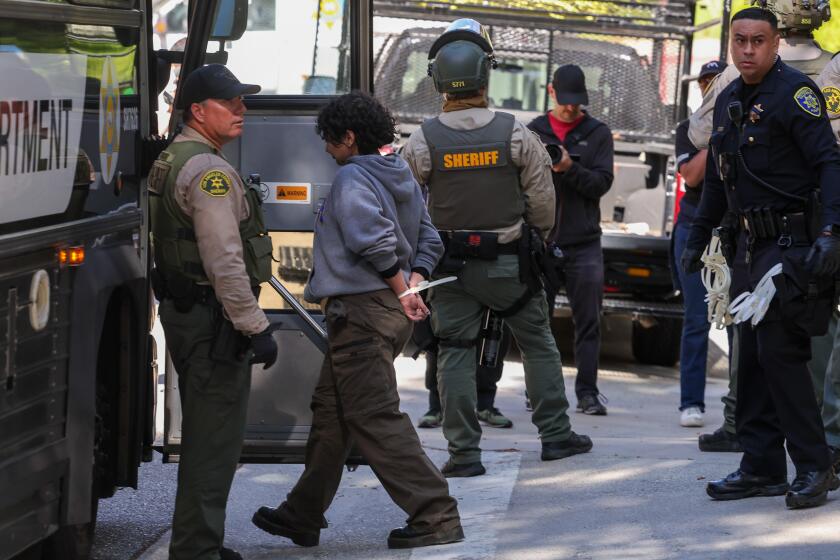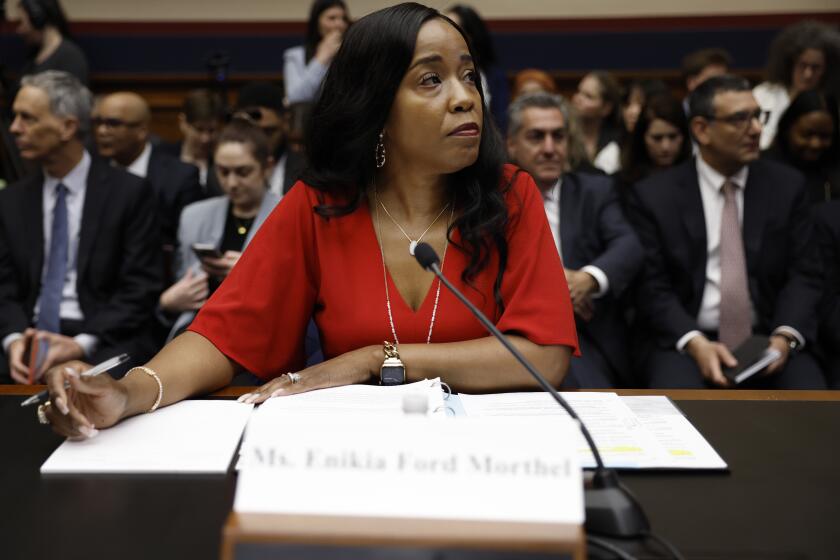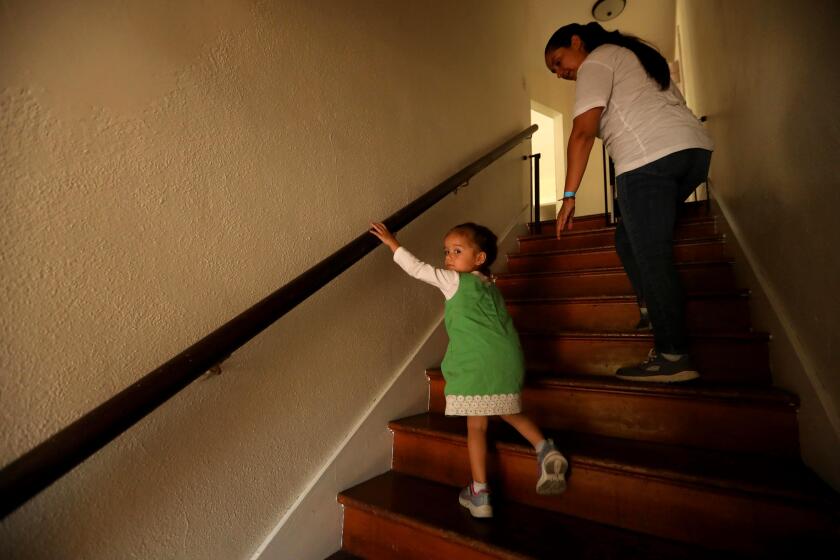Affirmative Action Proposal Stalls Atom Smasher Effort
Legislative efforts to bring a $4.4-billion federal atom smasher to California have been stalled by a bitter dispute over whether businesses owned by minorities and women would share in the financial bonanza.
Assembly Democrats have delayed action on a $560-million bond issue needed for initial financing of the Superconducting Super Collider project until they get support for amendments that would give women and minority-owned businesses 40% of the contracts generated by the bond issue.
The amendments would require, for the first time, that a substantial share of the investment banking and bond underwriting business is targeted for firms owned by blacks, Latinos, Asians and women.
But resistance is coming from Republicans, who claim that the 40% goal is unrealistic.
Wide-Ranging Issue
Complicating the issue are pledges by two influential black lawmakers, Assembly Speaker Willie Brown (D-San Francisco) and Assemblywoman Maxine Waters (D-Los Angeles), to insert the same amendments in all bond issues heading for the ballot next year.
Thus, the issue goes far beyond the question of the super collider and could affect financing for a range of big-ticket public works projects ranging from new prisons to school construction and water projects.
That also makes it much tougher to reach a compromise, and the political fight over minority participation is raising concerns among some state officials that California once again will lose in its competition with other states for a major high technology project. The state is still smarting from the loss last year of an important earthquake research center to New York.
This time around, California is one of more than 30 states seeking the super collider. States must submit their bids to the U.S. Department of Energy by Sept. 2.
Future Legislative Action
The California Collider Commission, set up by Gov. George Deukmejian to oversee the project, plans to submit two nine-volume bids even though the Legislature has not approved the $560-million revenue bond proposal that will provide initial financing for the project. The revenue bond issue, which the Legislature can approve without a vote of the people, is needed to purchase land, make surveys, and provide sewers and other improvements necessary for the project.
If the lawmakers cannot reach an agreement on the bond issue, California will have to submit its bid contingent on future legislative action.
“California must convince the Department of Energy that the state is serious and will eventually approve the financing mechanisms for the state’s share of the project,” said Jesse Shaw, special assistant to William Baker, chairman of the collider commission’s steering committee.
If authorized by Congress, the Superconducting Super Collider will be “the world’s largest scientific instrument,” supporters say. The super collider would be an underground, oval tunnel with with a circumference of 53 miles. The state would have to purchase 8,000 acres of farmland to clear the way for the project.
Officials say the massive public works project would employ 25,000 workers in 1991 at the peak of its construction, and would require a full-time work force of 2,500 to run it.
Scientists would use superconducting magnets to propel subatomic particles at great speeds around the oval in order to smash them. Scientists say these collisions will allow them to study the smallest elements of matter and perhaps provide answers about the origins of the universe.
Two sites in California are being considered, one east of Stockton and the other west of Sacramento.
While the project has generated some opposition--chiefly among farmers who oppose taking so much land out of agricultural production and who fear urbanization of their rural communities--there appears to be a consensus among state officials that the super collider would be good for the state.
Parties Far Apart
Despite strong support by both Democratic and Republican leaders, they remain far apart on the lengths the legislation should go in assuring that minorities get a share of the project.
As it stands, Assembly Democrats want to set goals that would give firms owned by women 20% of the business and firms owned by minority businessmen a 20% share.
The percentages sought by Democrats go substantially beyond current requirements for all state highway and prison construction projects--13% for minority businessmen and 3% for firms owned by women.
Speaker Brown defended the proposed goals. “I don’t know how anyone in this day and age who is committed at all to equality of opportunity would object to those provisions,” he said at a recent news conference, declaring that the percentages roughly approximate minority population in California.
‘Good-Faith Effort’
Brown and other supporters of the amendments insisted that only goals--not quotas, or fixed percentages--are being proposed. Smaller percentages of each population group could be hired, they say, as long as “a good-faith effort” is made to give contracts to minorities and women.
Assembly Republican Leader Pat Nolan of Glendale replied that the difference between quotas and goals is a distinction without a difference.
“Why do they insist on (fixed percentages) if they aren’t quotas?” he asked. “Those who can do the best job for the least money ought to be hired. The essence of a quota is that the minority will get the contract over someone who is qualified and can do it cheaper.”
Nolan also argued that there are not enough qualified minorities to meet the requirements being talked about for the super collider project.
‘A Poison Pill’
“I don’t know any firm that could come up with 20% women engineers on a big construction job. I don’t know any bonding house that has 20% minorities and 20% women, so the bonds couldn’t even be sold,” the GOP leader said.
Nolan called the amendments “a poison pill” offered by opponents of the project to kill it, saying of Assemblywoman Waters: “She wants to make it so unpalatable to us that we won’t vote for it.” He offered no explanation about what motive Waters would have for wanting to kill the project.
The assemblywoman, long involved in minority and feminist politics, laughed at Nolan’s claim and said this is just part of an ongoing fight for equal opportunity. Waters said that Nolan’s contention that there are not enough “qualified” minorities is an old argument that has long-since been discredited.
Programs a Success
Waters pointed to success in highway and prison construction programs, fields traditionally controlled by white, male contractors.
State officials say minority and women-owned businesses received $49.1 million in prison construction contracts in 1986, up 273% over the previous year.
The California Department of Transportation is expected to award contracts to women and minorities this year worth between $120 million and $150 million, or 17% to 18% of the total contracts awarded by Caltrans.
Despite the statistical success, the efforts to steer business to these groups remain controversial. Critics argue that there is substantial room in the program for abuse.
Current requirements define minority enterprises as businesses that are 51% owned by a minority member or a woman. Critics say it is relatively easy for a husband to give title to his business to his wife. They also claim that the rewards are so great that some minority contractors rush to start their own businesses before they are ready, or take projects that are bigger than they can handle.
Increased Costs Cited
Critics also say the programs result in increased costs. Some allow minority contractors to come in with a bid 5% higher than their competitors and still get the contract.
The first time such requirements were written into law was in legislation authorizing the reconstruction of the historic state Capitol in 1975. That law required that 20% of the contracts go to black, Latino, Asian and other minority contractors. Since then, affirmative action goals have been debated with mixed results on issues ranging from legislation to implement the California Lottery and bills to expand the state water project.
Fixed goals in highway and prison construction are now set in law. But there are general objectives for contracts awarded by the Lottery Commission. Minority contracting requirements were written into 1980 legislation authorizing a $7-billion expansion of the state water project, but that project, known as the peripheral canal, was subsequently defeated by voters.
Loudest Voice of Protest
Over the years, the loudest voice of protest has come from the Associated General Contractors of California, which has fought affirmative action programs in the Legislature and the courts.
“The success of these programs has been marginal, at best,” said Richard B. Munn, executive vice president of the contractors organization. “All they are doing is preparing an artificial market for minority firms without them having to go out and compete on an open market.”
Munn estimated that the minority program in state highway construction has driven up costs 10%. He said white contractors now go out and hire minority subcontractors to meet the affirmative action goals, when those same contractors used to do the work themselves at lower costs. Munn also repeated the criticism that some “unqualified” minority subcontractors get contracts and fail to perform.
Traditionally Been Closed
Minority subcontractors give a different view. They say the state programs have been a huge success in helping them crack an industry that has traditionally been closed to them.
Frank Azevedo, owner of a Sacramento electrical contracting business, strongly disputed the contention that there are not enough qualified minority business owners in the construction industry.
“A lot of the general contractors don’t think minority subcontractors are qualified,” he said. “The easiest way to convince them is to show them you know what you are doing. If you are capable, they want you back.”
Azevedo figured that if he gets a few contracts because he is a Latino, he also loses them for the same reason.
Because state law requires general contractors to prove that they tried to solicit minority firms for subcontracting work on state projects such as prisons, Azevedo said he is deluged with requests to bid, even though he suspects that some of the letters are pro forma.
‘All We Need’
“I don’t expect to get every job I bid on. I figure if I get one in 15 or 17, I am very fortunate. That’s all we need,” he said, sitting behind his desk in the offices of his Four-Star Electric Co.
H. Kimura, who owns a metal fabricating business in Fresno, has bid successfully on several prison construction jobs. “The big problem was getting your foot in the door. As long as they know you can . . . perform, they come looking for you. You become part of the old boy network.”
Setting minority goals on state bond proposals would break ground in a whole new area: the investment banking business, which even more than construction is said to be closed at its highest levels to minority groups and women.
Under amendments proposed by Assembly Democrats, firms owned by minorities and women would be due for a share of contracts for services for financial advisers, bond counsel, financial printers and other professional services related to the sale of bonds in addition to whatever construction projects are required.
Encourage Minorities
Napoleon Brandford, part owner of the San Francisco investment banking firm of Grigsby, Brandford & Co. Inc., said the proposed requirement would encourage blacks and other minorities to start their own banking firms. Branford’s firm is one of the nation’s few investment banking firms that is black-owned. He said he could think of only one black who was made a partner in one of the 10 major Wall Street investment banking firms.
‘The only way minority firms can get into the system is through elected officials passing laws,” Brandford said.
More to Read
Get the L.A. Times Politics newsletter
Deeply reported insights into legislation, politics and policy from Sacramento, Washington and beyond. In your inbox three times per week.
You may occasionally receive promotional content from the Los Angeles Times.






